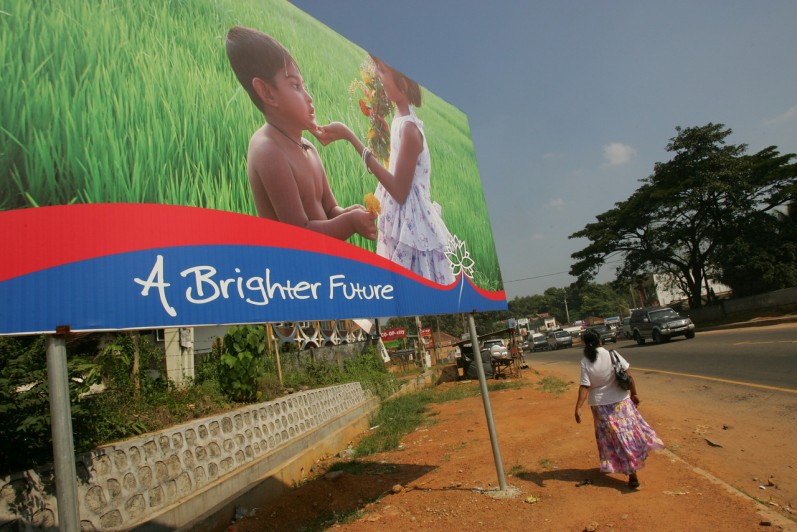The streets were dark and mostly deserted on my ride from the airport to downtown Colombo. As I peered out the window, the place seems more “tidy” than before, there are only a few soldiers on the street, manning checkpoints at big intersections and bridges, but they don’t flag us down and ask for documentation this time. Even at 2:00am, I can feel the more relaxed atmosphere here. Now that a true peace has come to Sri Lanka, optimism, and hope for a bright future seems to be the state of mind.
I’m here to document the Asia Foundation’s revitalization programs in the war torn areas of the north, including Jaffna, were the bulk of the intense fighting took place. With me is Brent Jones, Asia Foundation’s, Strategic Communications writer from New York City.
I’ll be capturing images of The Aisa Foundation’s programs aimed at IMPROVING THE BUSINESS ENVIRONMENT
Below, I’ve copied information from the Aisa Foundation’s website, and added a few photos to give you a bit of information….
Sri Lanka’s economic growth has accelerated since the end of the war, but growth, investment, and employment are still concentrated in the Western Province, in and around the country’s capital and commercial hub. The government has embarked on an ambitious program to give lagging regions a greater stake in the country’s post-war prosperity, by building infrastructure to shrink distances and connect regional producers to larger markets at home and abroad. The Asia Foundation is supporting government and private sector efforts to form partnerships that improve the regulatory environment for growth and investment and foster livelihood and employment opportunities in lagging regions of Sri Lanka.
Small and medium enterprises (SMEs) are key to the growth of Sri Lanka’s regional economies, but an Asia Foundation survey of SMEs found costly hurdles confronting regional entrepreneurs in expanding their businesses and creating jobs. Permits, regulations, transportation problems, and counterproductive relationships with government at all levels tie up time and assets, preventing businesses and communities from flourishing. In 2009, the Foundation embarked on a bold strategy
to help SMEs unite to advocate more effectively for their own interests. Foundation staff worked with business owners and local officials to initiate regular public-private dialogues where thorny infrastructure issues are now frankly discussed and solved. If an issue stalls with local or regional leaders, entrepreneurs can make their voices heard at the national level. These dialogues have improved local business environments throughout the island and provide a forum for identifying actionable public-private partnerships to improve the local business environment. They typify the Foundation’s commitment to a balanced, even- handed approach in post-war Sri Lanka.
-War left a legacy of mistrust between the Sri Lankan Police Service and the communities it serves. While police were preoccupied with fighting insurgents and maintaining state security, ordinary citizens were often afraid to approach them with concerns about crime and conflict in their communities. Surveys show the police still rank low in the public trust, but a few intrepid civil society organizations and local police chiefs are trying to bridge the gap between citizens and police through new community policing practices.
Asia Foundation supported public- private dialogues are improving local business environments.
Foundation support enabled the Ministry of Justice to establish community mediation boards in regions emerging from conflict
More than 3.4 million books have been donated to Sri Lankan libraries, schools, and institutions since 1954.
The Asia Foundation is a private, nonprofit, non-governmental organization. Through its programs, the Foundation builds leadership, improves policies, and strengthens institutions to foster greater openness and shared prosperity in the Asia-Pacific region. It is funded by contributions from corporations, foundations, individuals, and governmental organizations in the U.S., Europe, Canada, Australia, and Asia, and an annual appropriation from the U.S. Congress.
A 2009 survey in Kandy and Moneragala Districts found that roughly 90 percent of Sinhalese, Tamils, and Muslims believed police and the community could successfully work together on local security challenges, but that communities wanted more positive, personal interactions with the police, in addition to routine encounters such as vehicle checkpoints and police station reports. The Inspector General of Police has called on the police force to become a more “people-friendly” service. In community policing pilot projects in the Kandy and Moneragala Districts supported by The Asia Foundation, the police have begun joining citizens at community-police forums, where community members and police can have frank exchanges about the everyday problems of crime, disputes, and community disturbances, and how to resolve them. The forums are facilitated by community leaders selected by the Foundation’s two NGO partners, Kandurata Community Development Foundation and Vehilihini Development Centre.
Expanding these community policing projects to the entire island will require context-specific implementation, due to the unique realities facing each locale. Communities were affected in different ways during the war, based on their location, population, and ethnic makeup. While this makes community policing a complex challenge in the wake of a traumatizing civil war, reconciliation and building community-police relations of trust and cooperation have never been more important.
for more info here’s a Slide show from my 2010 visit
Stay tuned, as I will be updating the blog with photos and information whenever I can during this assignment.



![taf_srilanka_2011_0019_std[1]](http://karlgrobl.com/blog/wp-content/uploads/taf_srilanka_2011_0019_std1.jpg)
![taf_srilanka_2011_0038_std[1]](http://karlgrobl.com/blog/wp-content/uploads/taf_srilanka_2011_0038_std1.jpg)
![SriLanka2[1]](http://karlgrobl.com/blog/wp-content/uploads/SriLanka21.jpg)
![taf_srilanka_2011_0036_std[1]](http://karlgrobl.com/blog/wp-content/uploads/taf_srilanka_2011_0036_std1.jpg)
![SriLanka3[1]](http://karlgrobl.com/blog/wp-content/uploads/SriLanka31.jpg)
![taf_srilanka_2011_0061_std[1]](http://karlgrobl.com/blog/wp-content/uploads/taf_srilanka_2011_0061_std1.jpg)
![taf_srilanka_2011_0054_std[1]](http://karlgrobl.com/blog/wp-content/uploads/taf_srilanka_2011_0054_std1.jpg)





